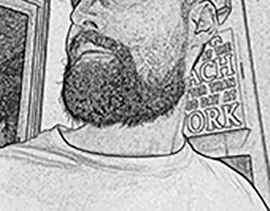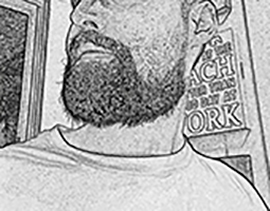For some men, achieving a luscious beard can feel like an elusive goal. Despite the desire to join the ranks of bearded individuals, some factors might be hindering your beard growth journey. In this article, we’ll explore the five common reasons why growing a beard seems challenging and discuss some practical steps to maximize your facial hair potential.
- Genetics: The thickness of your beard is deeply rooted in your genetic makeup. If thick beards run in your family, chances are you have the genetic predisposition for facial hair growth. Understanding the role of androgens and the enzyme 5-alpha reductase in converting testosterone into dihydrotestosterone (DHT) can shed light on your beard’s potential. However, the sensitivity of your hair follicles to DHT is largely determined by genetics, influencing the strength of its effect.
- Age: Beard growth often matures until around age 30. If you’re in your teens or early 20s, patience is key, as your beard is likely to become thicker with age.
- Ethnicity: Your ethnicity plays a role in facial hair growth patterns. Different races may exhibit varying beard growth tendencies. For example, individuals from Mediterranean countries may have a higher likelihood of growing thick beards compared to those from other regions.
- Alopecia Areata: Alopecia areata, an autoimmune condition, can lead to hair loss in patches, affecting both scalp and facial hair. While there’s no cure, various treatment options exist to manage this condition.
- Low Testosterone Levels: In some cases, low testosterone levels can contribute to poor beard growth. However, unless clinically low, testosterone levels are unlikely to be the primary factor. Symptoms such as low sex drive, fatigue, and mood changes may accompany low testosterone.
Methods to Enhance Beard Growth
While you can’t alter your genetics, lifestyle changes can optimize your beard-growing potential. Here are some practical steps:
- Eat a healthy diet: A balanced diet ensures essential nutrients, preventing micronutrient deficiencies that might impact hair growth.
- Be patient: If you’re in your teens or 20s, your beard may continue to thicken with age.
- Reduce stress: Stress may influence beard thickness, so incorporating stress-reducing practices can be beneficial.
- Get adequate sleep: Quality sleep supports overall health, including hair growth.
- Avoid smoking: Smoking can negatively impact both skin and hair health.
Take Away
Understanding the factors influencing beard growth is crucial for navigating your facial hair journey. While genetics play a significant role, adopting a healthy lifestyle can enhance your beard-growing potential. Be patient, embrace your genetic blueprint, and consider lifestyle adjustments to embark on a successful beard-growing adventure.





